Mining for meaning with Veta Louise actor Lauren Drexler
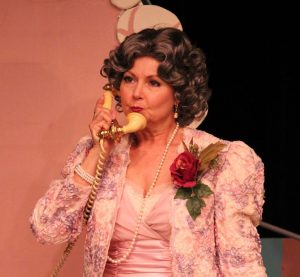 We settle on Lydia Black’s orange leather couch in a gloomy corner of the Alliance gallery for a quiet chat about Harvey and all things theater. It being late August, we eye the storm clouds building in the Southwest Florida sky, darkening the landscape outside. Jeff Abbott’s Lady with Black Dog lean in to eavesdrop on the soft spoken woman as she begins to speak. As with E.F. Hutton, when Lauren Drexler talks, everyone listens.
We settle on Lydia Black’s orange leather couch in a gloomy corner of the Alliance gallery for a quiet chat about Harvey and all things theater. It being late August, we eye the storm clouds building in the Southwest Florida sky, darkening the landscape outside. Jeff Abbott’s Lady with Black Dog lean in to eavesdrop on the soft spoken woman as she begins to speak. As with E.F. Hutton, when Lauren Drexler talks, everyone listens.
Every actor fashions 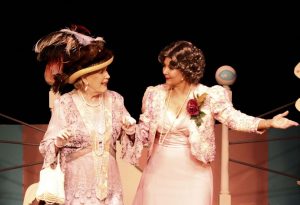 his or her unique approach to analyzing and developing the characters they play. Drexler’s is deliciously cerebral. She mines meaning from expositive, seeming inconsequential bits of dialogue to become intimately acquainted with her characters’ backstory, personalities, hopes and fears.
his or her unique approach to analyzing and developing the characters they play. Drexler’s is deliciously cerebral. She mines meaning from expositive, seeming inconsequential bits of dialogue to become intimately acquainted with her characters’ backstory, personalities, hopes and fears.
As thunder cracks in 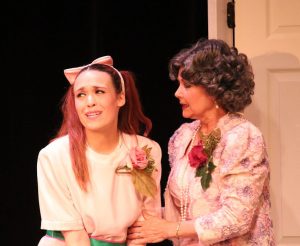 the background and the first drops of rain patter the patio and create pock marks on the surface of the retention pond outside the back door, Drexler cites a play written by Mary Miller titled Virgin Tears on Wyoming Avenue as an example of how she works. It was one of Theatre Conspiracy’s New Play Contest winners several years ago. The main characters were three sisters.
the background and the first drops of rain patter the patio and create pock marks on the surface of the retention pond outside the back door, Drexler cites a play written by Mary Miller titled Virgin Tears on Wyoming Avenue as an example of how she works. It was one of Theatre Conspiracy’s New Play Contest winners several years ago. The main characters were three sisters.
“In one scene, 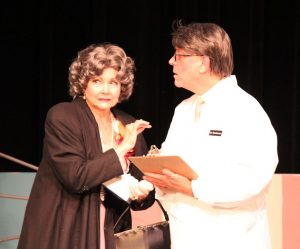 they’re looking at an old photo and one of the sisters says, ‘Look at those matching Easter dresses that mom made for us,’” Lauren relates, her voice hushed even though the gallery is closed to visitors. The Alliance is still busy. A walk-through for A Toast to Tenacity is taking place in the Foulds Theatre, rehearsals for Engagement Rules are beginning in a classroom around the corner, and the rest of the cast for Harvey is gathering around Bill Taylor at the reception desk.
they’re looking at an old photo and one of the sisters says, ‘Look at those matching Easter dresses that mom made for us,’” Lauren relates, her voice hushed even though the gallery is closed to visitors. The Alliance is still busy. A walk-through for A Toast to Tenacity is taking place in the Foulds Theatre, rehearsals for Engagement Rules are beginning in a classroom around the corner, and the rest of the cast for Harvey is gathering around Bill Taylor at the reception desk.
“Look 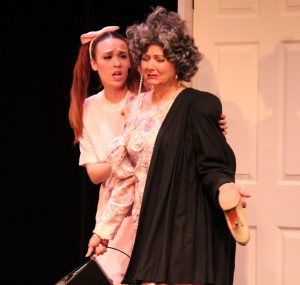 at how much that one sentence tells you,” Lauren continues, her voice rising an octave. “A mother who physically makes Easter dresses for all three of her daughters! It fills in reams and reams about that character’s backstory. If she’d do that, you can imagine all the other things that mother did for her girls – loving things this character was exposed to as a child and young adult, and how that informs who she is now and the conflict she’s going through. It just weaves together in such a wonderful tapestry.”
at how much that one sentence tells you,” Lauren continues, her voice rising an octave. “A mother who physically makes Easter dresses for all three of her daughters! It fills in reams and reams about that character’s backstory. If she’d do that, you can imagine all the other things that mother did for her girls – loving things this character was exposed to as a child and young adult, and how that informs who she is now and the conflict she’s going through. It just weaves together in such a wonderful tapestry.”
Drexler’s 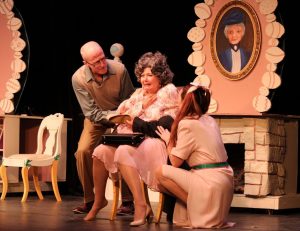 uncanny ability to mine meaning from the seemingly inconsequential is informed not only by her vast experience in film and theater, but by her involvement as a reader in Theatre Conspiracy’s New Play Contest. Each year, Theatre Conspiracy receives around 600 submissions from around the country. In some years, even more. Obviously, Artistic Director Bill Taylor cannot personally read every single submission, so he’s appointed a panel
uncanny ability to mine meaning from the seemingly inconsequential is informed not only by her vast experience in film and theater, but by her involvement as a reader in Theatre Conspiracy’s New Play Contest. Each year, Theatre Conspiracy receives around 600 submissions from around the country. In some years, even more. Obviously, Artistic Director Bill Taylor cannot personally read every single submission, so he’s appointed a panel 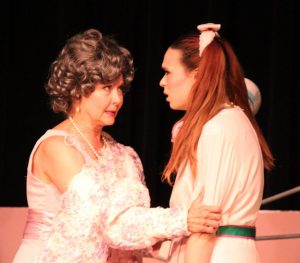 to read and rate a portion of the scripts. Lauren is on that team.
to read and rate a portion of the scripts. Lauren is on that team.
“I end up reading between 50 and 60 plays each season,” Lauren says matter-of-factly, speaking once more in her soft, distinctive library/museum voice.
“Acting is storytelling, which is great fun no matter whether the play is a classic or a new or absurd piece. And that’s why I enjoy reading and working on the new pieces.”
In 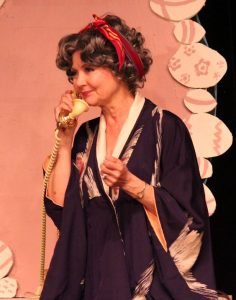 addition to Virgin Tears on Wyoming Avenue, Drexler has appeared in Repossessed, Becoming Eleanor, The Dunes, Here Lie the Demons, and Romantic Fools.
addition to Virgin Tears on Wyoming Avenue, Drexler has appeared in Repossessed, Becoming Eleanor, The Dunes, Here Lie the Demons, and Romantic Fools.
Since they’ve never been produced before, New Play Contest winners like these afford the opportunity to really dig in and do in-depth character analysis.
“Solely from the playwright’s words,” Lauren emphasizes.
Perhaps because she reads so many new plays or simply out of an abundance of respect, Drexler believes the playwright’s words are sacrosanct and it is the job of the actor and director to distill his or intent from the 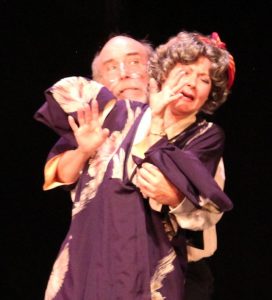 clues provided in the dialogue and notes provided in the script.
clues provided in the dialogue and notes provided in the script.
And that’s true of Mary Chase’s American classic, Harvey.
“Harvey is such a classic play. It was very successful on Broadway, and it was a successful movie,” she says with a profound sense of awe. “I saw the play a hundred years ago; I last saw the movie maybe 10 years ago or so. The character of Veta is similar in both the play and the movie.”
That’s true even 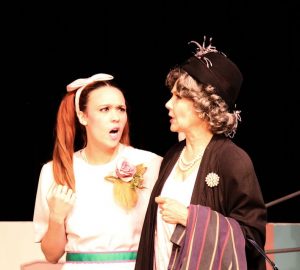 though the play and movie differ slightly.
though the play and movie differ slightly.
“But she’s much more complex than one would think at first because [spoiler alert] she believes and doesn’t believe at the same time.”
In fact, Veta Louise’s admission that she too has seen her brother’s pookah comes with the force of a thunderclap toward the end of the play. As the audience comes to understand ultimately, the source of her 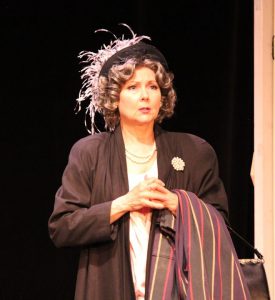 discomfort is not that she doesn’t believe in Harvey, but rather that his presence is fraught with so much baggage.
discomfort is not that she doesn’t believe in Harvey, but rather that his presence is fraught with so much baggage.
“It certainly jeopardizes their standing in the community, which back in the ‘40s was huge,” Lauren remarks. “What your neighbors and your peers thought of you in the community or town where you lived was a much bigger deal than it is today.”
Plus, Veta is trying to find her daughter Myrtle Mae (played by Stella Zuri) a good husband.
But having a crazy 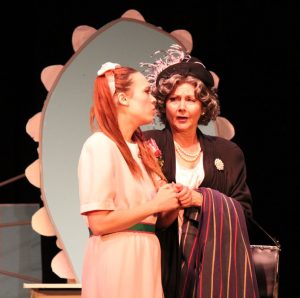 uncle isn’t doing much for Myrtle Mae’s stock as a suitable bride for a young man from a good family with his sights set on a career in medicine, law, finance or industry.
uncle isn’t doing much for Myrtle Mae’s stock as a suitable bride for a young man from a good family with his sights set on a career in medicine, law, finance or industry.
“So in [Act One], Veta is upset. She’s tense. She’s anxious. She’s weepy. She’s nervous. Because she’s pushing for social acceptance and perfection in her life and for Myrtle Mae.”
But it’s here that Drexler zeroes in on one of those seemingly innocuous, inconsequential lines to ferret out profound 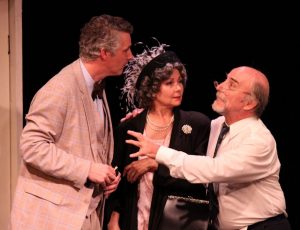 meaning in how her character actually feels about her brother’s invisible friend.
meaning in how her character actually feels about her brother’s invisible friend.
“It comes in the scene where Veta returns home all disheveled after being institutionalized herself. ‘I should have known better than to try to do something to [Elwood],’ Veta moans. ‘Something protects him. That awful pookah.’ Why did she choose to use the word ‘awful’? I don’t think the word awful describes the pookah, 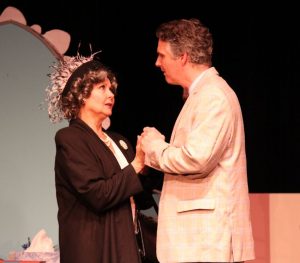 but rather all the confusion that he causes. The situation [his presence] engenders is what’s awful, because people aren’t embracing it.”
but rather all the confusion that he causes. The situation [his presence] engenders is what’s awful, because people aren’t embracing it.”
This interpretation provides a whole new understanding of Veta Louise and her relationship not only with Elwood, but Harvey as well. It’s not that she doesn’t believe in Harvey or thinks that her brother has lost touch with reality. Rather, her problem with Harvey is the personal and social 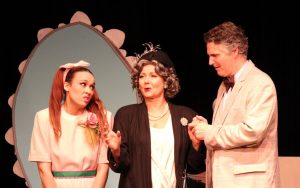 upheaval he causes both for her and for Myrtle Mae.
upheaval he causes both for her and for Myrtle Mae.
And it is this realization that best explains what happens at the end of the play. But it’s not just that she changes her mind about having her brother committed to the sanitarium or given a shot that will prevent him from seeing Harvey any more.
“There’s a 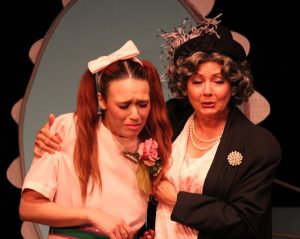 line that comes at the end of the show that I hope doesn’t get lost in the cacophany.”
line that comes at the end of the show that I hope doesn’t get lost in the cacophany.”
It comes after the taxi driver (played by Patrick Day) describes how people change after getting the injection that Drs. Chumley (Scott Thomson) and Sanderson (Rob Green) are preparing to administer to Elwood (Brandon Powers).
“She bangs on the door and yells to Dr. Chumley not to give 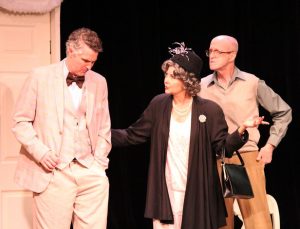 Elwood the shot. ‘I know people like that. I don’t like people like that,’ she cries. But Myrtle Mae and Judge Gaffney (Stephen Hooper) try to stop her and have Chumley go ahead and administer the shot. She turns to Myrtle Mae and says ‘I’ve lived longer than you. I remember my father. I remember your father. I remember.’”
Elwood the shot. ‘I know people like that. I don’t like people like that,’ she cries. But Myrtle Mae and Judge Gaffney (Stephen Hooper) try to stop her and have Chumley go ahead and administer the shot. She turns to Myrtle Mae and says ‘I’ve lived longer than you. I remember my father. I remember your father. I remember.’”
Remember what?
“The way I read 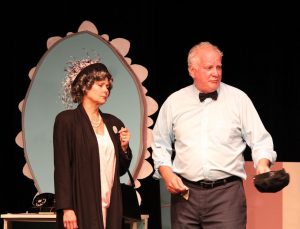 that is that all of the Dowd men – not only Elwood, but my husband, Mr. Simmons – who I cannot help but think was great friends with Elwood – and our father (Elwood’s and mine) – all had some sort of pookah in their lives. They had that little magical thing about them. That one line says it all. ‘Nothing else matters. I want that magic. I want that magic in our lives.’”
that is that all of the Dowd men – not only Elwood, but my husband, Mr. Simmons – who I cannot help but think was great friends with Elwood – and our father (Elwood’s and mine) – all had some sort of pookah in their lives. They had that little magical thing about them. That one line says it all. ‘Nothing else matters. I want that magic. I want that magic in our lives.’”
Drexler’s concerns 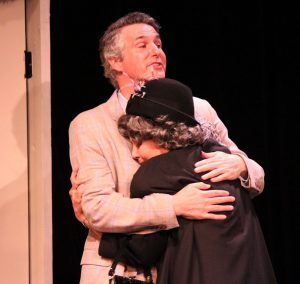 are well founded. There’s a lot going on in Harvey in that penultimate scene, and it would be easy and understandable if that little piece of dialogue were to get lost in the mix. It’s not just that Veta Louise, like her brother, is opting for pleasant over smart (or PC). She’s opting for the magical, and that inheres in our differences and the way they flavor how we see and approach people and life.
are well founded. There’s a lot going on in Harvey in that penultimate scene, and it would be easy and understandable if that little piece of dialogue were to get lost in the mix. It’s not just that Veta Louise, like her brother, is opting for pleasant over smart (or PC). She’s opting for the magical, and that inheres in our differences and the way they flavor how we see and approach people and life.
“Could you imagine what a paradise the world would be if everyone were 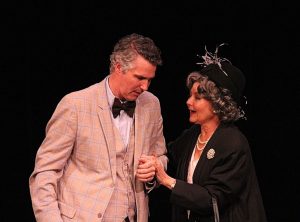 just pleasant?” asks Lauren as the rain falls in torrents on the other side of the plate glass.
just pleasant?” asks Lauren as the rain falls in torrents on the other side of the plate glass.
Indeed.
Can you imagine what life would be like if we embraced each other’s differences, quirks and idiosyncrasies rather than using them to separate and divide us, one from the other.
Given her cerebral 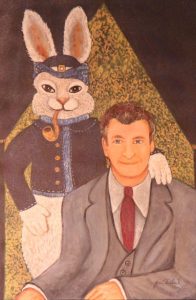 approach to character analysis and cultured respect to each playwright’s work and written words, it’s no wonder that the roles Lauren Drexler assumes have become so memorable. A previous reviewer said of her role in Madea that it was a role “she alone was destined to play for us.” Ditto for Veta Louise. Although she was not originally cast in the part, you’ll agree after seeing her in Harvey that it’s hard to imagine anyone else playing the part better. Lauren was destined to be Veta Louise in this show. Go see Harvey and find out for yourself.
approach to character analysis and cultured respect to each playwright’s work and written words, it’s no wonder that the roles Lauren Drexler assumes have become so memorable. A previous reviewer said of her role in Madea that it was a role “she alone was destined to play for us.” Ditto for Veta Louise. Although she was not originally cast in the part, you’ll agree after seeing her in Harvey that it’s hard to imagine anyone else playing the part better. Lauren was destined to be Veta Louise in this show. Go see Harvey and find out for yourself.
August 22, 2019.














 Tom Hall is both an amateur artist and aspiring novelist who writes art quest thrillers. He is in the final stages of completing his debut novel titled "Art Detective," a story that fictionalizes the discovery of the fabled billion-dollar Impressionist collection of Parisian art dealer Josse Bernheim-Jeune, thought by many to have perished during World War II when the collection's hiding place, Castle de Rastignac in southern France, was destroyed by the Wehrmacht in reprisal for attacks made by members of the Resistance operating in the area. A former tax attorney, Tom holds a bachelor's degree as well as both a juris doctorate and masters of laws in taxation from the University of Florida. Tom lives in Estero, Florida with his fiancee, Connie, and their four cats.
Tom Hall is both an amateur artist and aspiring novelist who writes art quest thrillers. He is in the final stages of completing his debut novel titled "Art Detective," a story that fictionalizes the discovery of the fabled billion-dollar Impressionist collection of Parisian art dealer Josse Bernheim-Jeune, thought by many to have perished during World War II when the collection's hiding place, Castle de Rastignac in southern France, was destroyed by the Wehrmacht in reprisal for attacks made by members of the Resistance operating in the area. A former tax attorney, Tom holds a bachelor's degree as well as both a juris doctorate and masters of laws in taxation from the University of Florida. Tom lives in Estero, Florida with his fiancee, Connie, and their four cats.